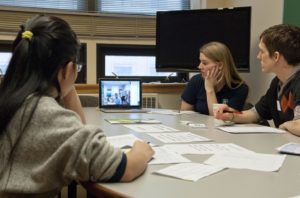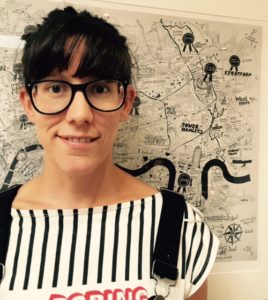 As a clinical academic it has been an epic journey for me from working as a speech and language therapist to submitting my PhD just 3 months ago. I was working with people with language led dementia, called primary progressive aphasia (PPA), and their families. Looking to the research literature to ensure I was delivering evidence based practice I found that the word retrieval therapies that dominated this tiny pool of research literature didn’t meet the needs of people with PPA and their families. I found myself looking to the stroke aphasia literature, to the social approaches and communication partner interventions that I felt did meet the needs of the people I was working with. These were interventions that improved the quality of life and relationships of people with stroke aphasia and that I believe could have the same impact, and additionally maximise independence in people with PPA. This inspired me to pursue an application to the NIHR for a Doctoral Research Fellowship to undertake a PhD to develop and pilot a communication partner training programme for people with PPA and their families entitled Better Conversations with PPA.
As a clinical academic it has been an epic journey for me from working as a speech and language therapist to submitting my PhD just 3 months ago. I was working with people with language led dementia, called primary progressive aphasia (PPA), and their families. Looking to the research literature to ensure I was delivering evidence based practice I found that the word retrieval therapies that dominated this tiny pool of research literature didn’t meet the needs of people with PPA and their families. I found myself looking to the stroke aphasia literature, to the social approaches and communication partner interventions that I felt did meet the needs of the people I was working with. These were interventions that improved the quality of life and relationships of people with stroke aphasia and that I believe could have the same impact, and additionally maximise independence in people with PPA. This inspired me to pursue an application to the NIHR for a Doctoral Research Fellowship to undertake a PhD to develop and pilot a communication partner training programme for people with PPA and their families entitled Better Conversations with PPA.
I segued from my clinical role as a clinical specialist speech and language therapist into my PhD at UCL, where I studied for 4 years. My PhD comprised 3 stages over 4 years. In line with the Medical Research Council guidelines on developing complex interventions these stages constituted phase I work to develop and refine the intervention and phase II exploratory work in the form of a randomised controlled pilot-feasibility study across 11 NHS. I have already published 4 peer reviewed journal articles from my PhD on a UK wide survey of speech and language therapy practices in PPA, a systematic review of the functional communication focused literature in this area and the protocol for my pilot-feasibility study. Another is I preparation, describing the development and co-production of the intervention itself.
When the funding for the PhD finished (last September) I commenced two new roles as a senior lecturer at UCL and a brand new position as a senior speech and language therapist in the Cognitive Disorders Service, aligned with the Dementia Research Centre at UCLH, in the National Hospital for Neurology and Neurosurgery. These roles allow me to both teach student speech and language therapists on their role in dementia, and on qualitative research methods, but also to provide a clinical hub and spoke service, whereby I contribute to the diagnosis and management of people with PPA. In this role I see people with PPA as well as advising local Speech and Language Therapy Services on their role. These roles allowed me the time and space to also complete the writing for my thesis, which I submitted in December.
I have, over the last 3 months of so, alternately looked forward to and alternately dreaded my viva. My viva was scheduled for the 8th April and it symbolised both the potential to move to the next stage of my clinical academic career- the gateway to applying for more funding to do further research in this area. The viva also represented the dreaded conversation, where I would be questioned in great detail on what I have actually done.
When Covid-19 hit the UK, we identified our patients with dementia as being in a potential risk category. Given their language difficulties, people with PPA in particular, may need additional accessible advice and guidance to understand the concept of COVID-19 and to follow the guidance given. At present I continue to see patients virtually, or on the telephone. I am giving direct guidance, forwarding accessible written materials to family members. I have problem solved with family members how to manage the decision-making of their loved ones, I have made wallet cards for people to carry with information on their diagnosis and communication difficulties. I have problem-solved access to food shopping and prescriptions. I have delivered a lot of remote therapy for people who’s PPA continues to deteriorate and who have limited windows to make the most of language rehabilitation. I have supported families, developed strategies and delivered communication partner training remotely to maintain relationships between people in social isolation.
When COVID-19 hit, I was also advised that my viva had been postponed, to the Autumn. I was terribly disappointed. Given everything else going on I was keen for some normality, and to get the viva done. Revising for the viva had already taken up a significant portion of my time, and I was planning a grant application, that somewhat depended on me having submitted my PhD. Within a week the viva was back on. Now scheduled as a virtual viva. I feel relived but equally rather exhausted simply by the idea of this virtual viva.

I have found it quite hard to knuckle down and concentrate on the viva, when I have continued to spend 3 days of my week supporting people with dementia to get through this pandemic, when I am supporting my speech and language therapy colleagues on wards where people with COVDI-19 are fighting for their lives. That said I have also found it a great anecdote. In the scheme of things my viva is only a viva. I will just get it done and out of the way, and then I can focus more on the issues at hand (oh and home schooling the kids). So my tips for preparing for the virtual viva at this slightly strange time are thus:
- Remember: the viva is still important, people are and will still have dementia after the pandemic and they still need interventions to support them to live well, perhaps now more so than ever.
- On the up side a virtual viva means you don’t have to worry about the your entire outfit quite so much. I am going with a collared top, but Ill probably wear my slippers with this.
- Running a mock viva, in the spot in the house where you plan to have the viva is handy. Making sure the technology works, making sure the screen background is appropriate and the sound and picture work is valuable.
- Running a mock viva is a good way of making things real, it focuses the mind and doesn’t allow you to get distracted.
- Also you can video record your mock viva and go over every minor detail, the wording of every answer etc.
- Do connect with other people doing their viva. Just because you are not in the office with them, doesn’t mean they are not around. Discuss strategies, potential questions and stupid issues (such as how to hold your thesis, whether having a coffee or water is more appropriate etc).
- Take a look at the guidelines for virtual vivas and run over this with your supervisor- I recommend staying in touch, even the odd call to help you focus and bring you back to the task at hand.
- Schedule a virtual debrief/glass of wine for after the event. You will still need it and your supervisory team and peers will still want to support you.
- Tell you clinical colleagues- they will still be supportive! As will the patients/research participants. The work is still important.
- Maybe consider enjoying it? Maybe.
Ill let you know how I get on with mine. 4 days to go from writing this (with 2 clinical days in there for good measure) !?!?
Ed: Here is a podcast you might also find useful.
Author [1]
[1]
Anna Volkmer [2] is a Speech and Language Therapist and NIHR Doctoral Research Fellow working in Language and Cognition, Department of Psychology and Language Sciences, University College London [3]. Anna is researching Speech and language therapy interventions in language led dementia and was once voted scariest speech and language therapist (even her children agree).